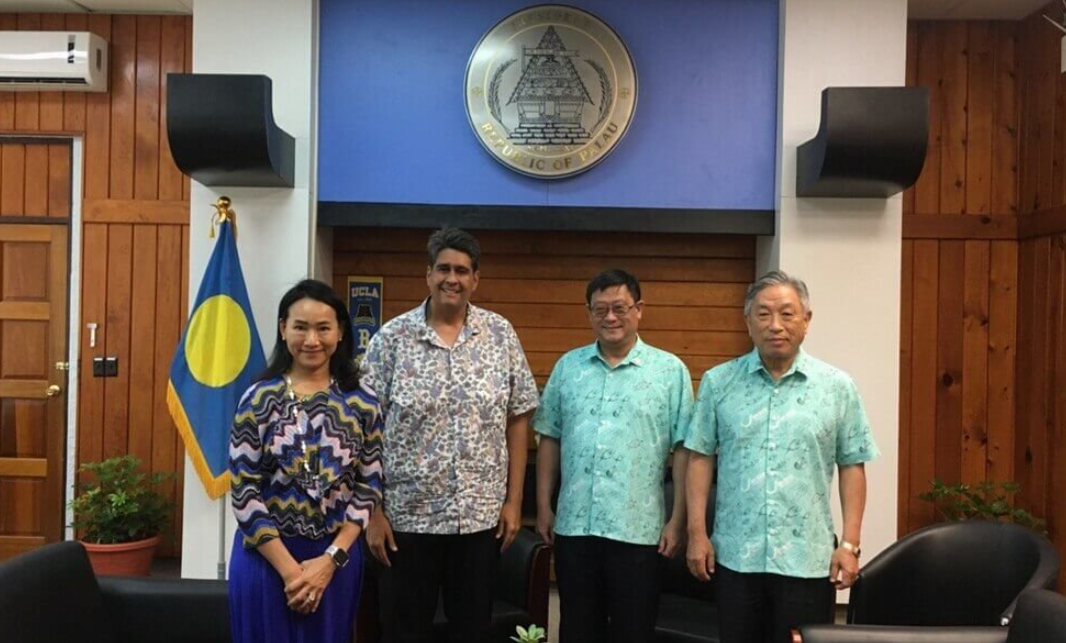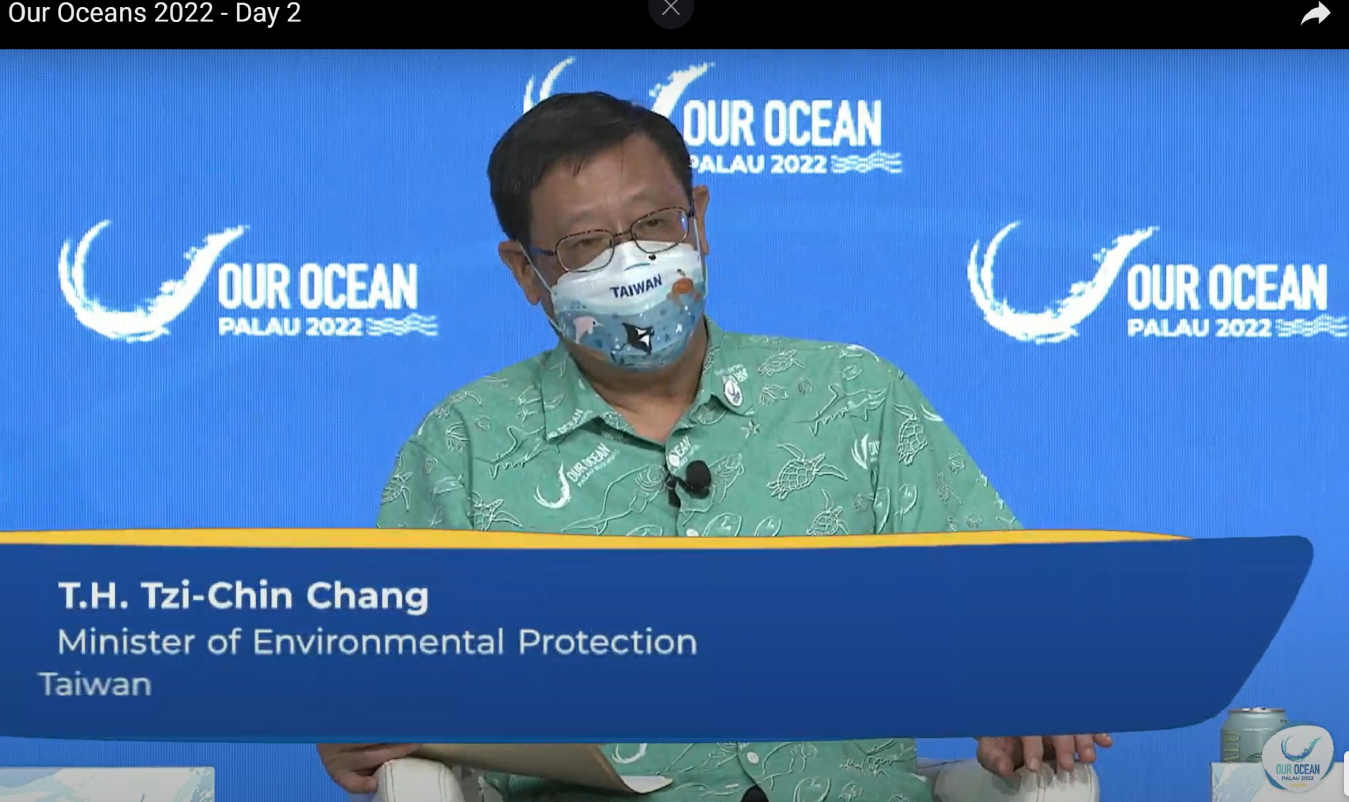The seventh Our Ocean Conference (OOC) took place in Palau on 13-14 April 2022, with EPA Minister Tzi-Chin Chang attending as an envoy assigned by President Tsai and giving a speech in the session “Tackling Marine Pollution.” In addition to sharing Taiwan's environmental protection experience, Minister Chang suggested that other nations consider source reduction, circular economy, and the promotion of environmental education and citizen participation as ways to make the world’s oceans cleaner.
Our Ocean Conference (OOC)
Founded in 2014 by John Kerry, who is the current U.S. Special Presidential Envoy for Climate, the first Our Ocean Conference (OOC) was held in Washington, DC. Hosts in following years have included Chile, the EU, Indonesia, Norway, and others. Every OOC has seen the attendance of several heads of state and vice leaders, as well as representatives of government authorities in charge of environment, sustainability, or marine conservation.
The 7th OOC, titled Our Ocean, Our People, Our Prosperity, focus on six areas of Action, including “Advancing Marine Protected Areas for Communities, Ecosystems, and Climate” “Tackling Marine Pollution” “Confronting the Ocean-Climate Crisis or Towards an Ocean Solution for Climate Change” “Creating Sustainable Blue Economies” “Advancing Sustainable Small-Scale Fisheries and Aquaculture” and “Achieving a Safe, Just and Secure Ocean”.
The Republic of Palau and the United States opened the 7th OOC on April 13, 2022, marking the first time this event held in a small island developing state (SIDS).
Joint Taiwan-Palau efforts lead to EPA Minister’s attendance at the OOC, a first by a government representative from Taiwan
The Ministry of Foreign Affairs (MOFA) pointed out that due to the Republic of Palau’s highly valued close diplomatic ties with Taiwan, Palau President Surangel S. Whipps, Jr. had particularly invited President Tsai Ing-wen to visit his country and attend the seventh OOC, a major event that Palau has always attended.
In response to President Whipps’ invitation, President Tsai appointed EPA Minister Tzi-Chin Chang to visit Palau and attend the event as an official representative of Taiwan. He was to share on the global stage Taiwan’s contributions to the marine environment and sustainable development as a responsible member of the Pacific region.
President Whipps met with the Taiwan delegation led by Minister Chang, and stated that as Pacific island states, both Taiwan and Palau have always been highly devoted to marine preservation and sustainable development, and together they work on creating a bright future for the entire Pacific region. He especially stressed the close diplomatic ties between Taiwan and Palau, hoping to continuously strengthen such a friendship.

EPA Minister Tzi-Chin Chang (second from the right) delivered a letter of credence to Palau President Whipps (second from the left) and attended the OOC as a Special Presidential Envoy. (Source: MOFA)
Minister Chang shares Taiwan’s experience and achievements in tackling marine pollution
In the session “Tackling Marine Pollution,” Minister Chang delivered a speech on relevant issues, which was a major breakthrough in the elevation of Taiwan’s participation in international marine activities. His presence at this event raised Taiwan’s status and image in global marine conservation efforts.
In his speech, Minister Chang pointed out that Taiwan, like Palau, is an island nation with beautiful coastlines and rich biodiversity. Taiwan is also facing the problem of marine pollution. The solution is: cut waste at the source and prevent it from entering the ocean.
In 1997, Taiwan started a nationwide waste recycling program. Over the years, the recycling rate has gradually increased. Currently, the recycling rate is more than 60%, and the recycling rate for PET bottles has surpassed 90%. Most of the remaining waste is sent to incinerators to generate electricity. Despite these efforts, however, some wastes still end up on the land and in the ocean.
Inter-ministerial Council promotes "Salute to the Ocean" and pledges to invest US$220 million
In 2020, the Taiwan EPA and other agencies launched a project called Salute to the Ocean. This project has committed a budget of more than US$220 million between 2020 and 2023.
It allowed Taiwan’s entire 1,988-kilometer coastline to be adopted by various organizations for cleanup, and a government-level integration and coordination platform was established by local governments to promote a number of source reduction measures. This project focuses on cutting down fishery wastes via controls at-source, intercepting garbage in rivers and improving the effectiveness of temporary storage sites and facilities for marine wastes to jointly maintain a clean coastal environment through inter-ministerial cooperation.
The Executive Yuan has established a mechanism of “regular cleaning” by integrating nine central government agencies and cooperating with 19 coastal local governments. It led to cleaning over 48,000 metric tons of marine wastes in just 2021 alone. Minister Chang pointed out that efforts were intensified to set up waste interception points at important river confluences, resulting in intercepting 22,651 metric tons of garbage from 2020 to 2021. Also, another major source of marine waste is fishing nets and gear. The EPA is collaborating with local governments to push registration of fishing gear under owners’ names, which, along with garbage interception, aims to reduce marine waste both at source and midstream.
Reduction at the source, 20 years of promoting plastic restriction
To further reduce marine plastic, since 2002, Taiwan has been restricting the use of disposable plastic. Statistics show that 4.5 billion plastic bags, 100 million straws and 200 million pieces of disposable tableware are reduced every year. In the future, through regulatory controls, economic incentives and innovative business models, Taiwan will continue to guide businesses and the public to change the throw-away culture, review and expand the targets controlled by the plastic restriction regulations, further promoting plastic reduction.
In 2018, Taiwan banned the manufacture, import and sale of cosmetics that contain plastic microbeads. And in 2019, Taiwan began banning plastic straws at government agencies, schools, department stores and shopping centers, and fast-food chains, and will continue to reduce the plastic consumption and comply with the UNEP’s agreement on plastic reduction planned for 2024.
Integrating marine waste into a circular economy, the World's First government-sponsored Marine Debris Recycled Product label introduced
To help Taiwan’s businesses integrate marine waste into a circular economy, the EPA introduced the Marine Debris Recycled Product label in 2021. This is the world’s first government-sponsored product label for recycled marine waste.
Taiwan’s industries have also come up with their own solutions to deal with marine waste. They have set a goal for plastic containers of nonfood items to be made with at least 25% of recycled materials by 2025. Companies such as Acer and LiteOn Technology use marine plastic wastes to make keyboards and other computer parts. And Minister Chang pointed out that even the OOC’s official shirt he was wearing was made from marine waste – specifically, from PET bottles found in Palau by Taiwan’s Shinkong Synthetic Fibers Corp.
In addition to sharing Taiwan's environmental protection experience, Minister Chang suggested that other nations consider source reduction, circular economy, and the promotion of environmental education and citizen participation as areas of cooperation. He said Taiwan would continue to cooperation with other nations so that oceans would become cleaner and the Earth protected.

Minister Chang delivering a speech in the OOC session “Tackling Marine Pollution”
 OOC group photo with Minister Chang (first row, second from right) and delegates from various nations. (Source: MOFA)
OOC group photo with Minister Chang (first row, second from right) and delegates from various nations. (Source: MOFA)
Fourteen commitments made by Taiwan’s ocean-related authorities officially documented
To demonstrate to the world Taiwan’s determination and contributions to protecting the ocean through practical actions, the OAC has coordinated with all the agencies involved in ocean-related affairs. Together they proposed 14 commitments with a total budget of US$383.81 million for the OOC’s six Action Areas, all of which have been officially documented by the OOC.
The commitments of the Government of the Republic of China (Taiwan) are as follows:
I. Area of action: Maritime Security
- Taiwan announces its commitment to implementing the Intelligent Navigation Safety Service and Development Plan.
- With international partners Taiwan has committed to continuously cracking down on maritime cross-border criminal activities.
- Taiwan declares its commitment to fulfill the universal value of humanitarian aid and to strengthen its capacity regarding life-saving and rescue at sea.
II. Area of action: Sustainable Blue Economy
- Taiwan has committed US$300,000 to complete a single-page web application for coastal recreational activities.
- Taiwan has pledged to pass the Marine Industry Development Act and enact the Marine Economy and Industry Development Plan.
- Taiwan announces its commitment to continuously optimize facilities and service efficiency of commercial ports to create a favorable operating environment for the shipping industry.
III. Area of action: Sustainable Fisheries
- Taiwan has committed to implementing a recreational fishing-friendly plan.
- Taiwan has committed to adopting a program to reinforce the management of Taiwan’s distant water fishing fleet and combat IUU fishing.
IV. Area of action: Marine Protected Areas
- Taiwan has committed to the legislation of the Marine Conservation Act.
- Taiwan has committed to promoting the Project for Marine Eco-Environment Protection in Taiwan.
V. Area of action: Marine Pollution
- Taiwan has committed to promoting the gillnet marking and management program.
- Taiwan has committed to implementing Saluting the Ocean Policy.
VI. Area of action: Climate Change
- Taiwan announces its commitment to developing the Atmosphere-Ocean Coupled Model.
- Taiwan has committed to promoting its Climate Change Adaptation Action Plan.
Aiming to promote Taiwan’s cooperation and exchanges with Palau and other like-minded nations
Minister Chang was interviewed by two major Palauan media outlets, the Island Times and Tia Belau, with whom he shared Taiwan’s policies and achievements in marine waste disposal, environmental conservation and climate change. He expressed that Taiwan will keep facilitating cooperation and exchanges with Palau and other like-minded countries.
Meeting with USEPA Assistant Administrator Jane Nishida
The Taiwan-US Agreement on Environmental Technology Collaboration has laid a solid foundation for exchanges and cooperation between the Taiwan EPA and the USEPA for nearly 30 years. Collaboration has gradually expanded from initially being bilateral to multilateral today. The Taiwan EPA has been working with USEPA in building regional capacity on environmental education, mercury monitoring, e-waste management, and air quality under the framework of the International Environmental Partnership (IEP) program.
During the OOC in Palau, USEPA Assistant Administrator Jane Nishida visited Taiwan’s Toward Zero Emission and Zero Waste Future Exhibition and afterwards suggested both the U.S. and Taiwan could further collaborate on issues such as marine pollution prevention and control, climate change impacts and a circular economy.

USEPA Assistance Administrator Jane Nishida (third from the right) and Taiwan EPA Minister Chang (third from the left)
Excerpt from Major Environmental Policies, May 2022